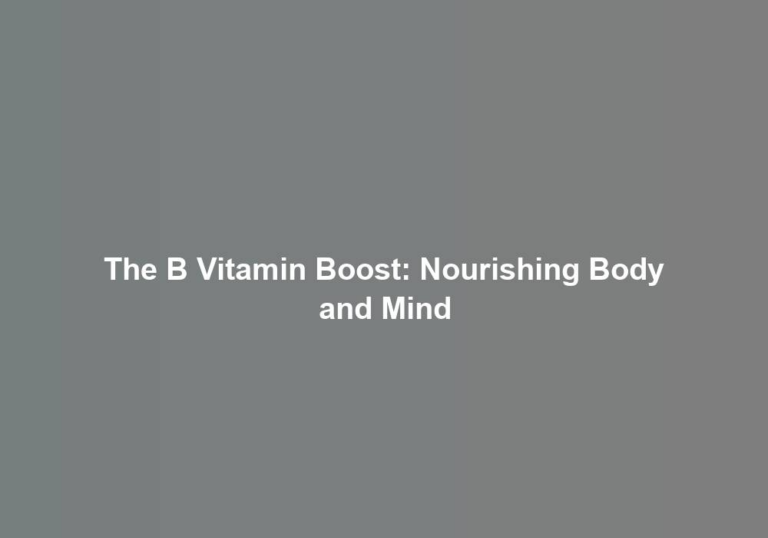Vitamin D: Sunshine for Your Health
You know how important it is to eat well and exercise regularly for your health. But have you considered the role that vitamin D plays in keeping your body functioning properly? ItG??s often called the G??sunshine vitaminG?? for a reason, and its benefits go far beyond just bone health. From boosting your immune system to supporting mental well-being, vitamin D has a wide-reaching impact on your overall health. But how much do you really know about this essential nutrient and how to ensure youG??re getting enough of it?
The Role of Vitamin D in Your Body
Vitamin D plays a crucial role in maintaining the health of your bones and immune system. When your skin is exposed to sunlight, it produces vitamin D, which is then absorbed into your bloodstream. This absorption can also occur through dietary sources like fortified milk, fatty fish, and supplements. Once in your body, vitamin D undergoes metabolism in the liver and kidneys to form the active compound that your body can use. This active form of vitamin D is essential for calcium absorption in the intestines, which is vital for bone health.
Moreover, vitamin D contributes to the regulation of your immune system. It helps in fighting off infections and reducing the risk of autoimmune diseases. Research suggests that low levels of vitamin D are associated with an increased susceptibility to infections and a higher risk of autoimmune conditions. Therefore, maintaining adequate levels of vitamin D is crucial for overall immune function.
In addition to bone health and immune function, vitamin D also plays a role in muscle function, cardiovascular health, and mental well-being. It is evident that vitamin D has a wide-ranging impact on various aspects of your health. Ensuring sufficient vitamin D absorption through sunlight, diet, and supplements, as well as supporting its proper metabolism, is essential for your overall well-being.
Health Benefits of Vitamin D
After understanding the role of vitamin D in your body, itG??s important to explore the health benefits it offers for overall well-being and functionality. Vitamin D plays a crucial role in skin protection. It can help prevent skin damage caused by the sunG??s harmful UV rays. By promoting the production of antimicrobial peptides, vitamin D also supports the skinG??s immune system, aiding in the prevention of infections and reducing inflammation.
In addition to skin protection, vitamin D is essential for immune support. It helps regulate the immune response, enhancing the bodyG??s ability to fight off infections and diseases. Research suggests that vitamin D deficiency is associated with an increased susceptibility to infections and autoimmune diseases. By ensuring adequate levels of vitamin D, you can help fortify your immune system, reducing the risk of illness and promoting overall health.
Incorporating vitamin D into your daily routine can have a positive impact on your well-being. Spending time in the sun, consuming vitamin D-rich foods, and taking supplements are effective ways to maintain optimal vitamin D levels. However, itG??s important to consult with a healthcare professional to determine the appropriate dosage for your individual needs. By prioritizing skin protection and immune support through adequate vitamin D intake, you can enhance your overall health and functionality.
Sources of Vitamin D
To maintain adequate levels of vitamin D, it is important to obtain it from a variety of sources, including sunlight, certain foods, and supplements. Sun exposure is one of the most natural ways for your body to obtain vitamin D. When your skin is exposed to sunlight, it produces vitamin D. However, itG??s essential to balance sun exposure to reduce the risk of skin damage. Aim for around 10-30 minutes of unprotected sun exposure, a few times a week, depending on your skin type, the time of day, and your location.
Dietary sources also play a crucial role in ensuring you get enough vitamin D. Fatty fish such as salmon, mackerel, and tuna are excellent natural sources of vitamin D. Additionally, egg yolks, cheese, and beef liver contain small amounts of vitamin D. Many foods are also fortified with vitamin D, including milk, orange juice, and some breakfast cereals. Including these in your diet can help boost your vitamin D intake.
If you struggle to get enough vitamin D from sunlight and dietary sources, supplements can be beneficial. Consult with a healthcare professional to determine the right dosage for you. Keep in mind that while supplements can be helpful, they should complement a healthy diet and sun exposure rather than replacing them entirely.
Vitamin D Deficiency and Its Impact
If you find yourself feeling fatigued, experiencing muscle weakness, or noticing an increased susceptibility to illness, you may be at risk for vitamin D deficiency and should consider discussing this with a healthcare professional. Vitamin D plays a crucial role in the functioning of your immune system. Research suggests that vitamin D deficiency can impact your immunity, making you more vulnerable to infections and illnesses. ItG??s important to note that while vitamin D is not a cure-all, maintaining adequate levels can support your bodyG??s ability to fight off infections.
In addition to its impact on immunity, vitamin D deficiency has also been linked to potential effects on mental health. Studies have indicated that low levels of vitamin D may be associated with an increased risk of depression and other mood disorders. While more research is needed to fully understand the relationship between vitamin D and mental health, itG??s clear that maintaining sufficient levels of this vitamin is important for overall well-being.
ItG??s essential to be mindful of the potential impact of vitamin D deficiency on your health, including its effects on immunity and mental well-being. Your healthcare provider can perform a simple blood test to measure your vitamin D levels and provide guidance on supplementation if necessary. By taking proactive steps to address any potential deficiency, you can support your bodyG??s immune function and overall health.
Tips for Getting Enough Vitamin D
To ensure that you are getting enough Vitamin D, consider incorporating foods rich in Vitamin D, such as fatty fish, egg yolks, and fortified dairy products, into your diet. However, if dietary sources alone arenG??t sufficient, sun exposure is another essential way to boost your Vitamin D levels. Spending time outdoors, particularly during the midday sun, allows your skin to produce Vitamin D naturally when exposed to UVB rays.
When it comes to dietary sources, fatty fish like salmon, mackerel, and tuna are excellent options. These fish are not only delicious but also packed with Vitamin D. Egg yolks are another great source, so donG??t shy away from that sunny-side-up egg. Additionally, fortified dairy products such as milk, yogurt, and some cereals can contribute to your daily Vitamin D intake. Including these in your regular meals can help ensure youG??re getting an adequate amount of this essential vitamin.
As for sun exposure, around 10-30 minutes of midday sunlight, a few times a week, is usually adequate to help your body produce Vitamin D. However, itG??s essential to find a balance, as excessive sun exposure can increase the risk of skin damage and cancer. Factors such as skin type, location, and season can also influence how much sun exposure is necessary for Vitamin D production.
Conclusion
So, go catch some rays and soak up that sunshine to boost your vitamin D levels. ItG??s like giving your body a dose of pure happiness and health. With the right amount of sun exposure and a balanced diet, you can keep your bones strong, support your immune system, and improve your overall well-being. DonG??t let the clouds get you down – embrace the sunshine and let it work its magic on your health!







